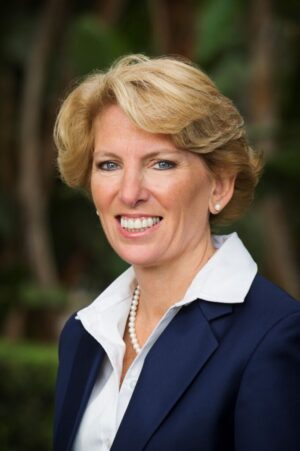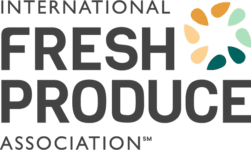IFPA CEO emphasizes action, advocacy in address
Citing challenges facing the global fresh produce and floral community, the leader of the International Fresh Produce Association emphasized action and advocacy as the vehicles through which the organization and its members will overcome those hurdles.
CEO Cathy Burns presented second annual State of the Industry address at the IFPA Global Produce & Floral Show, held Oct. 19-21 in Anaheim, California. Burns’ address ranged from geopolitical tensions, extreme weather events, consumer health trends, emergent technologies including generative AI, and more.

“We must look at how the state of things are, envision what we want the state of things to become, and most importantly, act to make it happen,” she said. “The good news is this industry knows how to invent from within and tap into innovation from outside our community.”
Burns also discussed the rise of artificial intelligence. Technologies such as generative AI and 3D-printing of food were cited as examples of innovation from outside the produce and floral community, as well as a palm scanner that measures how many vegetables a person has consumed. However, AI’s potential to reinvent many aspects of life was shown in:
- Retail and foodservice AI applications that enhance the customer experience, primarily suggesting meal solutions.
- Food waste applications, including dynamic pricing systems based on product freshness and AI-powered scanners that detect ripeness.
- Consumer AI applications such as smart cutting boards that track nutrition and calories as well as apps that use what’s in the refrigerator to recommend meal possibilities.
Burns cited McKinsey data that found, in agriculture, AI will most likely impact sales and marketing, software engineering, and supply chain logistics, according to a news release about her talk.
“While it is a bit early to paint AI as a villain, the reality is that businesses may struggle with its implementation and implications, especially since some work functions will likely evolve. Activities that absorb 60 to 70% of employees’ time today could be automated,” she said in her talk.
Extreme weather events have more than doubled in the past 30 years and could force more than 122 million more people into hunger and poverty within the next 7 years.
To help the produce and floral community understand the implications of this issue, Burns shared highlights from a recent IFPA global study on creating a climate-resilient future, which showed climate change as the second biggest consumer issue (following inflation) that needs action from governments, the public and businesses.
“IFPA’s sustainability strategy includes IFPA having a seat at larger tables where food systems conversations are happening,” Burns said in her talk. “We continue to lead environmental benchmarking work within the Consumer Goods Forum to ensure the most realistic and workable standards are created to provide consistency for the supply chain.”
 IFPA plans to participate in the November COP28 conference in Dubai to ensure industry representation and that fresh produce and floral is part of the solution though climate-smart agriculture practices, according to the release.
IFPA plans to participate in the November COP28 conference in Dubai to ensure industry representation and that fresh produce and floral is part of the solution though climate-smart agriculture practices, according to the release.
While businesses grapple with sustainability from an environmental perspective, human sustainability (defined as what happens when companies embrace helping their employees become healthier, more skilled, and connected to a sense of purpose and belonging) has emerged as a priority. Currently, 48% of employees and 53% of managers report being burned out at work.
When people are burned out, lower engagement costs the global economy $8.8 trillion, Burns said in her talk.
Burns also discussed findings by the Centers for Disease Control that more children ages 1 to 5 consumed a sugar-sweetened beverage than they consumed a daily vegetable or a daily fruit. The CDC also found that 1 in 3 children did not eat a daily fruit and nearly one half did not eat a daily vegetable.
“IFPA will continue to fight for full fruit and vegetable benefits in the WIC program and will continue efforts to have interventions like produce prescriptions embedding into the healthcare system and integrating them as a part of standard practice of clinical care,” Burns said. “IFPA’s collaboration with a North Carolina nonprofit saw it transform a $500,000 produce prescription grant into an $8 million in redemption of fruits and vegetables in a little over a year.”
In addition to IFPA’s policy efforts, the IFPA Foundation for Fresh Produce will work to increase consumption through numerous of consumer related programs and offerings, she said.
“You have said advocacy is your priority and you want it to be ours. IFPA has punched the advocacy accelerator. This community is the voice of authority, and we can help solve some of the biggest problems in the world,” Burns said. “We are here to get more people to eat more fresh fruits and vegetables and buy floral more often. Period. And we will act on that through a three-pronged approach of government relations, public relations, and consumer relations.
“Change starts here. Growing consumption starts here. Changing the world through advocacy starts here. Creating a vibrant future for all starts here. It’s the easiest thing in the world to say, ‘Someone ought to fix that.’ We are that someone. Yes, it will feel overwhelming at times, but no matter the size, nature, source, or timing of any challenge, action is the answer, always.”







